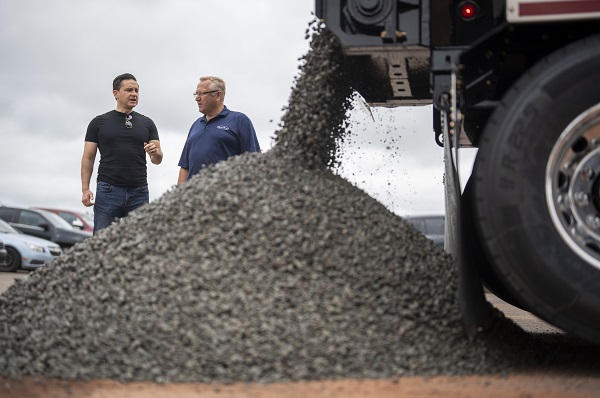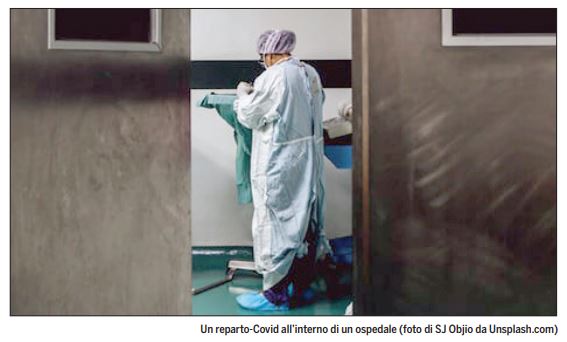Interview with Pierre Poilievre: “Stop the deficit, fight the housing crisis”
TORONTO – Pierre Poilievre, leader of Conservative Party of Canada, running to be Prime Minister of Canada, gave a year-end interview to the Corriere Canadese. In reality it was more of a relaxed dialogue touching on some of the hottest and most heartfelt topics recently in the public forum: housing, high cost of living and drug abuse crisis. We have attempted to reflect accurately what is depicted in the YouTube video below this article. Edits have been made to ease the flow of the conversation.
Canadians are absolutely flabbergasted at the cost of groceries; and they also are upset about the increased violence and disrespect for the world. We see that in the Toronto area everyday. At the same time, they are absolutely baffled by the cost of housing and rent. As you know, many of the people in the Italian Canadian Community, especially in Southern Ontario, as elsewhere, have a large presence in the construction business. As one would expect, they know more about housing than most other people. Where are we going to live tomorrow? And why does housing cost so much?
“The problem is twofold. One, these monster deficits the government runs drive up inflation and interest rates and that makes your mortgage payments bigger. We’ve got to cap spending and cut waste to balance the budget, bring down inflation and interest rates, as you did when you were in government. Second thing, is that we have the fewest number of homes per capita of any country in the G7, even though we have the most land to build on. That has led to Canada having the worst housing bubble arguably in the entire OECD. Our Toronto has the worst housing market in the world according to UBS Bank. Vancouver is the third worst when you compare median income to median house price; and, you can buy a castle in Scotland for a lower price than a two-bedroom in Kitchener. So, this is the record of Trudeau after eight years of doubling housing costs.
How do we get more home built? Well, the obstacle is getting the darn [housing] permits. We have the second slowest permitting in the OECD – that [has resulted in] adding 1.3 millions to the cost of every newly built [detached] house in Vancouver. Toronto and GTA and Southern Ontario municipalities have raised development chargers by 900%. Montreal has blocked 25,000 homes in the last three years. Winnipeg just blocked 2,000 homes [projected for construction] next to a transit station that was built for those homes… [but then put on hold] because City Council said constituents [no longer] wanted [passengers ?] as neighbours. We have got to get the bureaucracy out of the way.
Here’s my Common Sense Plan: I’m going to require that cities permit 15% more home completions per year as a condition of getting federal funding; I’m going to sell off 6,000 federal buildings and thousands of acres of federal land to build, build, build, build; I’ll require that CMHC approve financing for apartments in two months, rather than two years. That’s how we’re going to accelerate the construction [of homes]. We have the land, the labor, the lumber. We just need to get the government out of the way so that we can [get the job done].
You sound confident that the Provinces and the Municipalities that have given carriage over all of this are going to comply or be attracted by the incentives you put in place. Have you got something, anything, that suggests that you’re going to be successful in that regard?
“These Cities care more about money than anything else. Every time I meet with a mayor, they always say ‘I want money from the feds’ and my answers to them is: [you] get 5 billion now in recurring transfers directly form the feds to the cities. I’m going to say [these transfers are] going to be turned into a housing incentive. So, you either hit my target at 15% or your Municipality will get less money;. and if you exceed the target you’ll get a building bonus. In other words, I want to pay the local [housing] bureaucracies the way that realtors are paid, on commission. I want the bureaucracies to think about how they can speed up the building process – so they can get more federal money; and, you know, in instances where we see gross acts of gate-keeping, I would actually hold back transfers for large projects. If you want your transit line built you’ve got to get out of the way and let housing go ahead. We have to take a tougher approach because, right now, there are no incentives: they still get the big fat check evey month from the feds regardless of how long they take. They’ll never do it unless you link the outcome to the dollars”.
I just want to turn our attention over to some “Quality of Life” issues. People need to have a place to live, but they also must have acccess to affordable food and an opportunity to access those professionals who are going to provide care when they’re in need. First, what’s the plan for decreasing the prices on groceries?
“About food, we have this massive and growing carbon tax on the farmers who make the food and the truckers who ship it. One farmer alone in my riding is already paying $ 100,000 [annually] in carbon taxes [which are] expected to be quadrupled to 400,000 under the published Liberal envorinmental plan. Well, I would axe the tax on both the farmer and the trucker that bring us the goods, to allow them to produce more affordable produce. We’re also going to remove some of the unnecessary regulations on fertilizer use so that we can grow and produce more food on each acre of land we have, that will allow more output. A bigger supply equals a more affordable price, so that’s the main action on food is to stop taxing the farmers and the truckers who bring us our food”.
What solution do you propose for the kinds of essential services that everybody needs, at one time or another in their life, but especially as you get older: nursing care, medical care, etc. …we have a huge shortage in Health-care Professionals for a G7 country. It’s not a good picture. What are you going to do about it?
“On doctors, we have 20,000 immigrant doctors and 32,000 immigrant nurses banned from working because they have no direct path to prove their qualifications. In the trades, for 70 years we’ve had a Red Seal Exam for mechanics, electricians, etc., but we have no such thing in the other professions so I’m proposing a Blue Seal Exam for immigrant professionals to prove their qualifications and get to work within 60 days. I’ll back up 30,000 small study loans so that if someome needs time off work to study up to the Canadian standard they have a few bucks in their pocket to pay their bills in the meantime. Now we got to get the immigrant doctors and nurses into their role in the system and allow Canadian kids who study abroad, wheter it’s in Ireland or the Caribbean or the States, to come home, and, if necessary, take our exam and get to work and that’s how we’re going to increase the supply of doctors and nurses”.
How are you going to get the professional bodies on side?
“I’m going to say to the Provinces ‘look, guys, you’re getting a massive increase year after year in health care transfers which you claim is needed for more doctors. Well, here’s one way we can get more doctors who are already trained. You don’t have to put them through med school, so sign on to a Blue Seal Exam and legislate if necessary to get the medical licensing bodies to do the same. We did it with the Red Seal Exam’. The Provinces regulate the trades as well but they all agreed to one common national standard run by the Red Seal Council Of Canada that allows us to have a single license to be a carpenter anywhere in Canada. We’ve done that for 70 years, how is it that we haven’t been able to do the same in the professions? It’s crazy! So I’m going to use federal money as a lever.
There is something that seems to be a really critical issue: the increase in drug [toxic] dependency. What do you propose to do about this emergency?
“We’ve lost over 30,000 people in the last eight years to overdoses and the policy of the government has been to decriminalize crack and heroin and other hard drugs; it has only made the problem worse. They’re now giving you tax-funded opioids that are as strong as heroin and they claim it’s safe but at these ‘safe sites’ what we see is huge crime. We saw a middle-aged mother near Toronto shot dead by a stray bullet near one safe consumption site. Around the downtown east side of Vancouver it is likewise, filled with all these so-called ‘safe consumptions sites’ and yet we have six people a day in British Columbia dying of overdoses. My Common Sense Plan reverses decriminalization and handout of drugs and instead invests in recovery and treatment. For example, we can give people detox counseling fitness, yoga programs, group therapy for First Nations… then graduate them into a transitional apartments nearby so that they can come back a few times a week for counseling and workouts maybe even mentor incoming addicts.
That approach has worked where it has been tried and I’m going to put the money into that. I’m also going to sue the drug companies because they were the ones that started this thing: they flooded North America with oxycotin saying it was a harmless painkiller and instead it was a lethal and highly addictive drug that ultimately gave us the crisis we have today. The Americans have recoverwed $ 54 billion from these companies and I want to recover [proportionate] billions here in Canada and I will put that money to towards treatment to bring our loved ones home drug-free”.
Thank you and to all your readers… Buon Natale!




